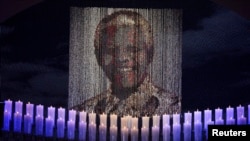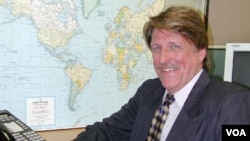QUNU, SOUTH AFRICA —
VOA Correspondent Scott Bobb spent a great deal of his 36-year VOA career covering Africa and South Africa in particular while based in Johannesburg from 2006 to 2011. He offered these reflections on the funeral of Nelson Mandela before leaving Qunu this week.
Stepping carefully down the still-muddy tracks of Qunu, past the small houses painted pink and green, past the cows grazing in the yards, the chickens pecking on porches and the clothes drying on barbed wire fences, I finally have a chance to reflect on the recent days and the last rites accorded to this world statesman, favorite son and extraordinary man.
The clouds hang heavy in the sky, almost touching the hills they have greened around the Mandela family compound. The house is large but not opulent.
The tent-cathedral and surrounding marquees that were used for the funeral are beginning to come down.
The national highway a few hundred meters from the house is open to traffic again. Motorists stop to snap pictures. It seems as if people can’t let go. They need one more photograph, one more souvenir, to hang in the museum of their life memories.
Dignitaries and family
The authorities did an amazing job of erecting hospitality tents and organizing accommodation, logistics and security for the hordes of visiting dignitaries: more than 100 current and former heads-of-state and celebrities from Bono to Oprah all of whom seemed to have a life-changing story to tell about one of their encounters with Nelson Mandela.
There were murmurs about how protocol for the luminaries and the state funerary excluded villagers and clan-members of Qunu from the ceremonies and failed to follow their traditions and their rites. Most residents were obliged to watch the funeral on television from another hill across the valley. But they came dressed in mourning clothes and dabbed their eyes just as if they were a few meters from the coffin.
Many of Madiba’s extended family were also excluded from the farewells. Only the closest members were invited.
Yet, the family was most generous in allowing the government, the country, the world to participate so intrusively in what many would have preferred to be a private time with the patriarch who was invisible to them for 27 prime years of his life.
One could argue that they were used to it, having had to share for so long their favorite uncle, grandfather and great-grandfather with countless millions around the world who reacted as if it was their father, grandfather or great-grandfather who had passed.
The ceremony, too, seemed dominated by state formalities: the military pallbearers, the drab olive caisson that carried the casket, the barrage of speeches by the famous and not-so famous.
Yet, the people had their moments. Sixty thousand attended the memorial service in Johannesburg. One hundred thousand viewed the body lying in state in Pretoria. Tens of thousands lined the streets for the funeral processions in Pretoria and Eastern Cape. And millions watched television broadcasts live on just about every major network in the world.
Residents of Qunu
So, as I kick a clump of sod down a street in Qunu, I think of the residents I have met and the more personal stories they told me.
One lady received a scholarship through the patriarch. She now heads the Nelson Mandela Museum in Qunu.
Another lady met him as a teenager when he was released from prison in 1990. She remembers his humility and serenity as she works in customer relations at a local supermarket.
Yet another recalls attending the Christmas parties Mandela hosted at the compound. He said for many, the gifts they unwrapped there were the only Christmas presents they received that season.
Another recalls that when Mandela was freed there was no electricity in Qunu. Now it is available to all but the poorest of the poor.
Schools, clinics and community centers, small but neat, dot the countryside. The highway links the remote town to Durban, Cape Town and beyond.
Many speak of the unfinished business of South Africa, the chasm between rich and poor, the avarice of the ruling class, the poor governance of elected leaders.
Yet, standing on a hillside in Qunu while the clouds sink lower to the ground, one cannot help but remark what has been accomplished in the mere two decades since the country moved from repression and despair to the freedom and opportunity-though still incomplete-of today.
One last thought as I prepare to leave. Mr. Mandela, even in death, had the grace to take his time, to linger, so that the people could become accustomed to life without him, so that a government could prepare the massive formalities that would be needed to carry off one of the great funerals of the time.
So the long goodbye has come to an end. Though his memory will linger among the living, Nelson Mandela now belongs to history, to those who came before and those who are yet to come.
Stepping carefully down the still-muddy tracks of Qunu, past the small houses painted pink and green, past the cows grazing in the yards, the chickens pecking on porches and the clothes drying on barbed wire fences, I finally have a chance to reflect on the recent days and the last rites accorded to this world statesman, favorite son and extraordinary man.
The clouds hang heavy in the sky, almost touching the hills they have greened around the Mandela family compound. The house is large but not opulent.
The tent-cathedral and surrounding marquees that were used for the funeral are beginning to come down.
The national highway a few hundred meters from the house is open to traffic again. Motorists stop to snap pictures. It seems as if people can’t let go. They need one more photograph, one more souvenir, to hang in the museum of their life memories.
Dignitaries and family
The authorities did an amazing job of erecting hospitality tents and organizing accommodation, logistics and security for the hordes of visiting dignitaries: more than 100 current and former heads-of-state and celebrities from Bono to Oprah all of whom seemed to have a life-changing story to tell about one of their encounters with Nelson Mandela.
There were murmurs about how protocol for the luminaries and the state funerary excluded villagers and clan-members of Qunu from the ceremonies and failed to follow their traditions and their rites. Most residents were obliged to watch the funeral on television from another hill across the valley. But they came dressed in mourning clothes and dabbed their eyes just as if they were a few meters from the coffin.
Many of Madiba’s extended family were also excluded from the farewells. Only the closest members were invited.
Yet, the family was most generous in allowing the government, the country, the world to participate so intrusively in what many would have preferred to be a private time with the patriarch who was invisible to them for 27 prime years of his life.
One could argue that they were used to it, having had to share for so long their favorite uncle, grandfather and great-grandfather with countless millions around the world who reacted as if it was their father, grandfather or great-grandfather who had passed.
The ceremony, too, seemed dominated by state formalities: the military pallbearers, the drab olive caisson that carried the casket, the barrage of speeches by the famous and not-so famous.
Yet, the people had their moments. Sixty thousand attended the memorial service in Johannesburg. One hundred thousand viewed the body lying in state in Pretoria. Tens of thousands lined the streets for the funeral processions in Pretoria and Eastern Cape. And millions watched television broadcasts live on just about every major network in the world.
Residents of Qunu
So, as I kick a clump of sod down a street in Qunu, I think of the residents I have met and the more personal stories they told me.
One lady received a scholarship through the patriarch. She now heads the Nelson Mandela Museum in Qunu.
Another lady met him as a teenager when he was released from prison in 1990. She remembers his humility and serenity as she works in customer relations at a local supermarket.
Yet another recalls attending the Christmas parties Mandela hosted at the compound. He said for many, the gifts they unwrapped there were the only Christmas presents they received that season.
Another recalls that when Mandela was freed there was no electricity in Qunu. Now it is available to all but the poorest of the poor.
Schools, clinics and community centers, small but neat, dot the countryside. The highway links the remote town to Durban, Cape Town and beyond.
Many speak of the unfinished business of South Africa, the chasm between rich and poor, the avarice of the ruling class, the poor governance of elected leaders.
Yet, standing on a hillside in Qunu while the clouds sink lower to the ground, one cannot help but remark what has been accomplished in the mere two decades since the country moved from repression and despair to the freedom and opportunity-though still incomplete-of today.
One last thought as I prepare to leave. Mr. Mandela, even in death, had the grace to take his time, to linger, so that the people could become accustomed to life without him, so that a government could prepare the massive formalities that would be needed to carry off one of the great funerals of the time.
So the long goodbye has come to an end. Though his memory will linger among the living, Nelson Mandela now belongs to history, to those who came before and those who are yet to come.





